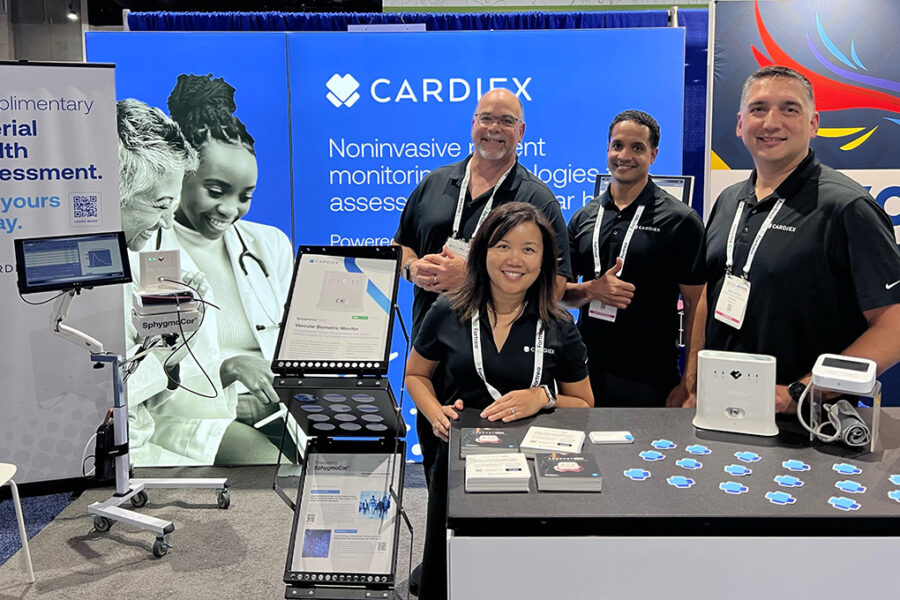
Congestive Heart Failure – 6 Things You Need to Know
January 11, 2022
Understanding Digital Vascular Biomarkers: What Is Augmentation Index?
March 15, 2023What Retired Female Boxer Daisy Lang Can Teach Us About Aging Well
Professional athletes are typically seen as icons of health and fitness. But what happens when these uber-fit competitors retire? As they adopt a more sedentary life, studies show many elite athletes gain weight, which increases their risk of chronic diseases such as Type 2 diabetes and heart disease. To prevent weight gain and its associated health risks, experts say it’s imperative that world class athletes keep a close eye on their fitness, diet and heart health when they leave the sport world. Retired professional boxer, Daisy Lang, 50, knows this all too well. At the recent American Academy of Anti-Aging Medical (A4M) Conference, the former world champion sat down with Atcor Medical’s Ric Ruffhead to share her story—and take a quick and non-invasive assessment of her heart health. Prepare to be inspired!
Atcor: Can you provide us a glimpse into your time as a world champion in three different sports?
Daisy Lang: I was born in 1972 in Bulgaria, grew up in Germany, and now call the US my home. I began my career as a martial artist. I have a black belt in Tae-kwon-do and was European champion in this discipline. In 1995, I became the world champion in karate and kickboxing in the USA. A year later, I helped pioneer women’s professional boxing in Europe, eventually becoming a three division world champion, a title I defended ten times successfully.
During my career, I lobbied to bring women’s boxing to the Olympics. I now see this activism as one of my greatest achievements. As this sport has become more popular with women, it has been extremely gratifying to witness the achievements of my followers. I am very proud of this!
Atcor: What was your training regimen like while you were competing? How did you maintain your health during periods of intense training?
DL: Many of the other young professional athletes who I spent time around ate poorly, smoked, and didn’t pay much attention to health or the way they lived. This often posed a problem because they needed to stay within their weight class. For me, maintaining a healthy diet was always a focus—perhaps more so than it was for other athletes—because I had to defend my title across three different weight classes. I was very strict about following a nutrient-rich diet. It was often necessary for me to make quick cuts and gains to qualify for my weight class before a fight. I always worried that this yo-yo dieting might someday have an impact on my heart health.
Atcor: Did you have a plan for maintaining your health when you decided to retire?
DL: Yes. In addition to boxing, I am trained as a physical therapist and this has always helped me take care of my body. When I retired, my muscles were so accustomed to training that I could not just stop and do nothing. I had been operating at a very high level as an athlete, so I knew I had to be smart about this transition. It took me four years to lower my workout intensity. Slowly reducing the rigor of my training helped reduce any chance of injury as I returned to a normal level of working out.
Atcor: Now that you are retired, what does your workout routine and diet look like today?
DL: I am 50-years-old but I feel great. I am a big believer that age is just a number. I still like to box. Not at a professional level, but for fun. It is a great stress reliever. Boxing helped preserve my sanity and health during the pandemic. I also like to run, hike, swim, and lift weights. I spend about an hour per day being active. If I can workout outside, I always feel better. I get energy from nature and the ocean. It doesn’t matter how busy I am, I always find 30 minutes to workout and never make an excuse.
Nutrition also plays a huge role in my healthy lifestyle; in fact, it is even more important when it comes to managing your weight. Experts say 70% is what you eat and 30% is your workout routine. My diet hasn’t changed since I retired. I still take supplements and eat lots of fresh fruit and vegetables, chicken and fish. I stay away from rice and potatoes and eat very few starches in general. I also drink a lot of water, don’t eat after 8PM and avoid sugar and fast foods because I feel horrible after eating them.
Atcor: When you walked by our ATCOR booth and saw that you could have your vascular health assessed, what did you expect to learn?
DL: When I saw the ATCOR booth, I was very interested because I have always been aware that my heart is the most important muscle in my body. I was excited to learn that such a simple test using a traditional brachial cuff could provide so much detail about how my heart was working. When it comes to heart health, professional athletes face the same challenges as other people. You can be very fit, but if you have a genetic propensity for high cholesterol and hypertension, you could still be at increased risk for cardiovascular disease.
Atcor: We just performed a non-invasive 3-minute assessment to look at your vascular health, including your subendocardial variability ratio, a measurement that shows how well your heart provides blood relative to demands (i.e. exercise). Your heart is currently supplying 163% of what you actually need! Your other digital vascular biomarkers—central blood pressure, central pulse pressure, augmentation pressure, and augmentation index—are all lower than normal for your age. Overall, there are no areas of concern. The assessment confirms your diet and exercise routine are helping to keep your vascular health strong.
DL: Wow! I’m so happy to hear that! It shows me that my diet, exercise and daily meditation practice are working. And this test was so easy and informative. Everyone should have access to this kind of assessment so that they can have peace of mind—or the knowledge they need to make lifestyle changes that will allow them to live longer and healthier lives.
To learn more about Daisy’s amazing journey, follow her on social media.
Instagram @daisylang1, Twitter @daisylangboxing, Facebook Daisy Lang



